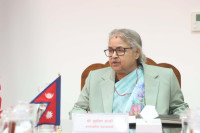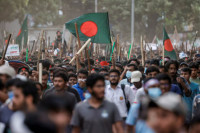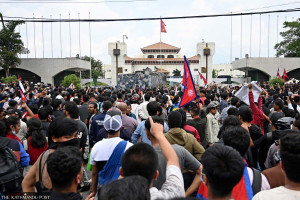Opinion
A game of chicken
Both coalitions, ruling and opposition, are locked head-to-head; who will flinch first?
After their pyrrhic victory in the CA, the NC-UML coalition is wooing its opponents to sit for negotiations. They have nominated Prime Minister Sushil Koirala, particularly infamous for his inaudible expressions, to negotiate with the opposition politics.
Playing chicken
The two coalitions have locked horns, but actually, they are in a ‘chicken game’ situation. To those not familiar with game theory, here is how this works: Imagine two truck drivers driving towards each other at full speed on a very narrow lane. If one of them does not stop, a collision is inevitable. If one of the drivers stops and gives passage to the other driver, he is tagged a ‘chicken’ or a coward while the other driver is seen as ‘macho’. No driver wants to be a loser, but if one does not flinch, there will be a collision. This is similar to game theory’s ‘prisoner’s dilemma’, but here, the parties have two options—either play chicken or act macho. Both parties playing chicken is far better than both parties playing macho. However, the problem is that you are tempted to play macho as you expect your opponent to play chicken. Who knows, your opponent may have similar reasoning. Nepal’s current political imbroglio, thus, is akin to this dilemma.
There are complex negotiation strategies and ploys to deal with the chicken game. Often, negotiators bring their opponents or push them to a chicken game situation so that they can have a clear win. What will you do if you are one of the truck drivers in the game and your opponent pulls out his steering wheel in full view and throws it out of the vehicle while still driving full speed towards you? Basically, your opponent is using ‘locked in’ tactics to make you give in to their demands.
Currently, both political coalitions are party to the chicken game. Who will flinch first? Will the NC-UML coalition give up and heed the consensus demand of the Maoist-Madhesi coalition? Or, alternatively, will it act like a macho truck driver and go ahead with the majority vote? The Maoist-Madhesi coalition is in a similar situation. Acting macho, it can quit the Assembly and give a jolt to the NC-UML or it can simply heed their call for a vote and play chicken?
Playing macho
However, both coalitions know very well that both playing macho would be political suicide. Yet, they both want a win over the other. Just listen to the words of UML Chairman KP Oli. There is no shortage of verbosity within the opposing camp as well. Comrade Prachanda has warned that the establishment is forcefully pushing the country to more conflict.
If the establishment faction is carefully wooing the opposition for talks, the
opposition is also carefully treading its path. It has said that it will quit the Assembly only as a last resort and that it will continue to wage agitations both within and outside the House. Even the proposed decisive street agitation programme has been carefully scheduled to start only from March 30. There are full two months before the country’s politics could take a different course. Comrade Prachanda’s strategic move to ally with the Mohan Baidya faction of the Maoists, who are demanding the dissolution of the Assembly itself, could be a move similar to that of our truck driver pulling out the steering wheel to lock the opponents into a negotiation. The same can be said about the NC-UML coalition. The threat of the Questionnaire Committee could simply be a tactical ploy.
Scheduling the protest programme in March could be another ploy, giving an indication of Janaanadolan III. Interestingly, March-April happens to be the season for political movements in Nepal. One possible reason may be that a large section of farmers remain out of work as the monsoon rains do not set in till June/July. It is also equally interesting that Nepal’s political turmoil takes place at an interval of every 10 years. After Janaandolan II in 2006/7, a decade is very much around the corner.
In the days to come, we will see more political manoeuvring, posturing, ploys, and even nataks. Given the fractious nature of both coalitions, the parties are making their calculative moves. Already, tensions are simmering in the Maoist-Madhesi coalition. It has been reported that the Baidya faction has also been alienated from the coalition. Meanwhile, Comrade Biplav is calling for the Maoists to quit the Assembly. Oli has literally softened his remarks while Madhav Nepal, another senior leader within NC-UML coalition, could be heard saying that his coalition is flawed. Both camps are fully aware of the fatal consequences of playing macho; therefore, one can fairly expect Nepal’s politics to drag on for a while. The possibility of erupting into abrupt violence is remote. People will continue to ask the question: aba ke hunchha? I do not think anyone has a definite answer. That may be the reason we call politics a game of possibilities.
Manandhar writes on governance and corruption issues




 5.4°C Kathmandu
5.4°C Kathmandu









%20(1).jpg&w=300&height=200)

